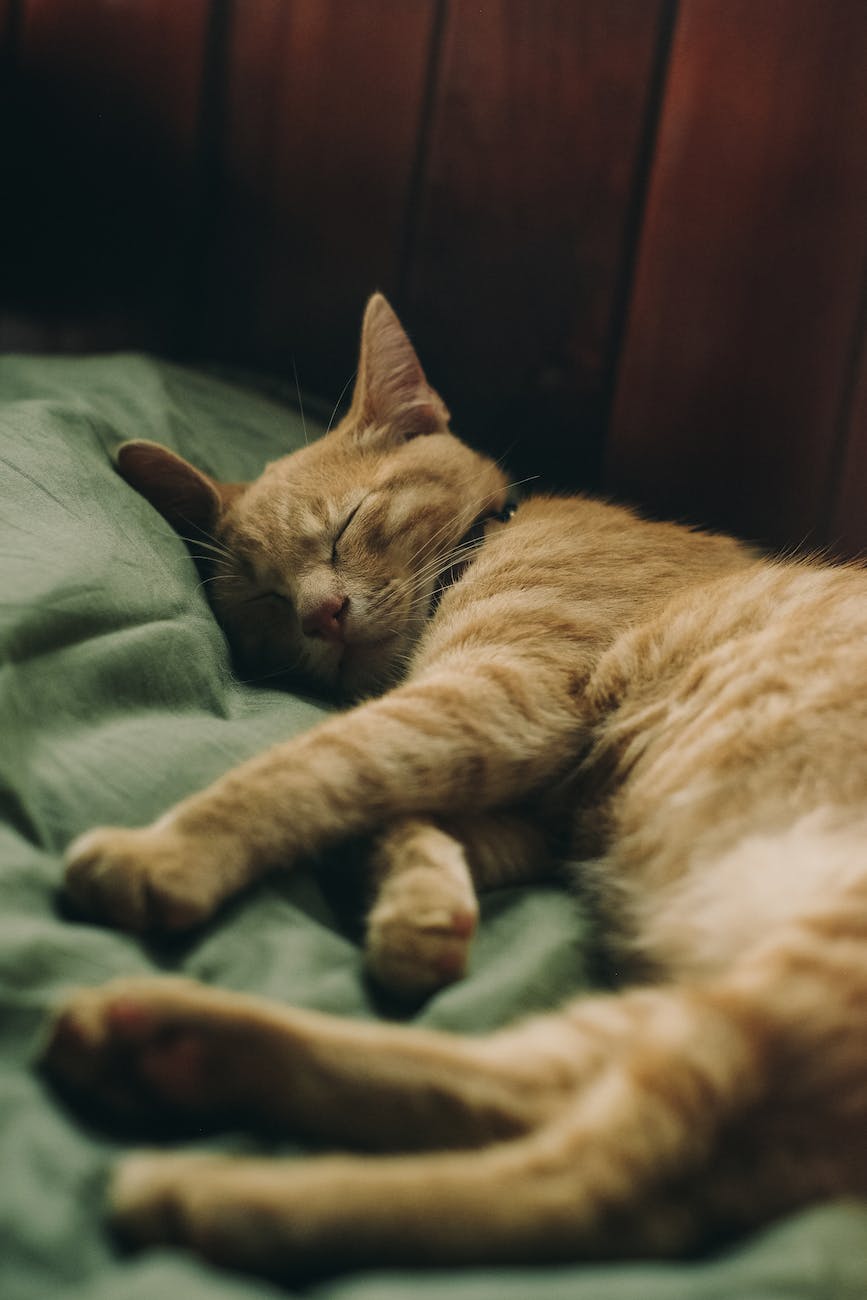
Stress is one of the most common health challenges of modern life. Deadlines, sleepless nights, and constant notifications keep our nervous systems on high alert. At the heart of the stress response is a hormone called cortisol — sometimes called the body’s built-in alarm system.
Cortisol isn’t “bad.” In fact, we wouldn’t survive without it. It helps regulate energy, mobilize fuel when we need it, and even dampen inflammation. But when cortisol stays too high for too long, it shifts from protective to damaging:
- Sleep becomes restless and shallow
- Weight creeps up, especially around the belly
- Anxiety increases
- Blood pressure and blood sugar rise
- Long-term cardiovascular and metabolic risks climb
That’s why researchers and wellness seekers alike have turned to lifestyle strategies for taming cortisol. One of the simplest? Tea.
Across cultures, tea has been used for centuries not just as a beverage, but as a ritual of calm. Modern science is now showing what tradition long suggested: certain teas may actually help reduce cortisol levels and support stress recovery.
Also Read: Fish Oil and Cortisol: Can Omega-3 Help You Manage Stress Hormones?
In this article, we’ll dive into the best teas to lower cortisol — green tea, black tea, matcha, and herbal infusions like chamomile and ashwagandha — and review what research says about how they work.
Cortisol 101: The Stress Hormone Explained
To understand how tea interacts with cortisol, we first need to understand how this hormone operates.
What Cortisol Does
Produced by the adrenal glands, cortisol plays a central role in the hypothalamic–pituitary–adrenal (HPA) axis, the body’s stress-response system. Its functions include:
- Energy regulation: increases glucose availability during stress
- Metabolism control: influences fat storage and protein breakdown
- Immune balance: tempers inflammation
- Stress response: sharpens focus, increases blood pressure and heart rate
Cortisol’s Daily Rhythm
Unlike adrenaline, which spikes in seconds, cortisol follows a circadian rhythm:
- Highest in the morning (the “cortisol awakening response”), helping you feel alert
- Declines across the day with small peaks around meals
- Lowest at night, allowing melatonin to rise and promote deep sleep
When stress is acute — like slamming on the brakes to avoid a crash — cortisol is your ally. But when stress is chronic — unrelenting work pressure, poor sleep, emotional strain — cortisol stops following its normal rhythm. Instead, it stays elevated all day and night, which:
- Disrupts sleep cycles
- Weakens immunity
- Fuels weight gain and insulin resistance
- Increases risk for depression and burnout
Curious if you might be experiencing cortisol imbalance? Check out 10 Symptoms of High Cortisol in Women: Signs, Causes & Relief for a deeper dive into early warning signs.
Why Lowering Cortisol Naturally Matters
While medications exist to blunt cortisol, they’re rarely used outside of serious disease. Most people benefit more from lifestyle interventions: exercise, mindfulness, diet — and, as emerging evidence shows, tea.
Tea is uniquely positioned as a cortisol-modulating tool because it combines:
- Phytochemicals like catechins, theaflavins, and adaptogenic compounds
- Amino acids like L-theanine, which alter brain waves
- A ritual of calm, which by itself helps activate the parasympathetic nervous system
In the following sections, we’ll explore each tea type in depth, highlight key studies, and provide practical guidance for weaving them into your routine.
Best Tea to Lower Cortisol (Quick Comparison)
Not all teas affect stress in the same way. Some calm the nervous system and improve sleep, while others directly influence cortisol production and recovery from stress.
Here’s a quick comparison of the most researched teas for cortisol management:
| Tea Type | Key Compounds | Cortisol Effect | Best For |
|---|---|---|---|
| Green Tea | EGCG, L-Theanine | Lowers cortisol, promotes relaxation & focus | Daily stress relief |
| Black Tea | Theaflavins, L-Theanine | Reduces post-stress cortisol, balances caffeine effects | Afternoon calm & focus |
| Matcha | High EGCG, L-Theanine | Strongest cortisol reduction, boosts mental clarity | Work & study focus |
| Chamomile Tea | Flavonoids (Apigenin) | Reduces anxiety, improves sleep, indirectly lowers cortisol | Evening relaxation |
| Ashwagandha Tea | Withanolides | Balances cortisol long-term, reduces fatigue | Chronic stress recovery |
👉 Which tea lowers cortisol the most?
- Matcha and green tea have the strongest evidence for direct cortisol reduction.
- Black tea lowers post-stress cortisol and helps the body recover faster.
- Chamomile supports sleep and relaxation, indirectly helping cortisol normalize.
- Ashwagandha is the most powerful adaptogen, reducing cortisol in multiple clinical trials.
is Green Tea best to Lower Cortisol Levels?
Green tea is often called the cortisol-lowering powerhouse — and with good reason. It contains a unique combination of compounds that directly and indirectly influence stress pathways.
Key Compounds in Green Tea
- Epigallocatechin gallate (EGCG): A catechin antioxidant that regulates the HPA axis and inhibits enzymes that regenerate cortisol.
- L-Theanine: An amino acid that promotes calm focus by increasing alpha brain waves and modulating neurotransmitters like GABA and serotonin.
- Caffeine (moderate levels): Provides alertness but in smaller doses than coffee, balanced by L-theanine to prevent sharp cortisol spikes.
Also Read: 7 Side Effects of Green Tea Everyone Should Know About.
Does Green Tea Lower Cortisol?
Yes. Multiple studies support this:
- A 2022 randomized human trial found that green tea consumption significantly reduced adrenal stress hormones, including cortisol, DHEA, and ACTH 【Almudhi et al., 2022 – PMC】.
- A 2024 human study comparing green tea and roasted green tea (hojicha) found that both improved task performance, reduced fatigue, and increased subjective refreshment compared to hot water — suggesting tea helps with stress recovery and resilience 【Kurosaka et al., 2024 – Nature】.
- A 2025 trial in young adults showed that consuming green tea during demanding cognitive tasks preserved arousal, prevented fatigue, and improved “flow” experiences compared to control groups 【Kurosaka et al., 2025 – PubMed】.
Together, these findings suggest that regular green tea drinkers may experience both lower cortisol and better resilience under stress.
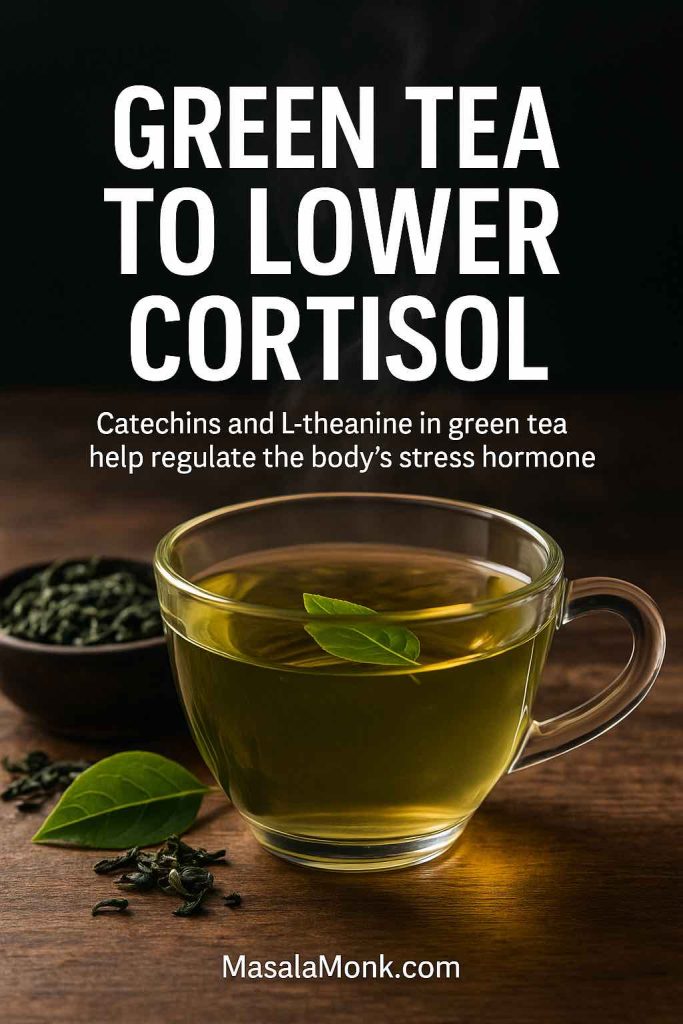
How Green Tea Works Mechanistically
- HPA Axis Regulation: EGCG helps dampen overactivity of the hypothalamic-pituitary-adrenal axis, reducing unnecessary cortisol secretion.
- Inhibiting Cortisol Activation: EGCG inhibits the enzyme 11β-HSD1, which converts inactive cortisone to active cortisol in tissues 【Hintzpeter et al., 2014 – ResearchGate】.
- Brain Chemistry Modulation: L-theanine increases alpha brain wave activity, promoting a calm but alert state. It also raises levels of calming neurotransmitters, counteracting the stimulating effect of caffeine.
Practical Guidance: How Much Green Tea?
- 3–5 cups per day is the typical range used in studies for noticeable effects.
- Opt for loose-leaf green tea or high-quality bags to maximize EGCG content.
- If you’re caffeine-sensitive, try decaffeinated green tea — it still contains L-theanine and catechins.
Best Times to Drink Green Tea for Cortisol
- Morning: Supports the natural cortisol awakening response, keeping energy steady.
- Early afternoon: Helps avoid the mid-day slump without overstimulating.
- Avoid late evening if caffeine disrupts your sleep.
Summary: Green Tea for Cortisol and Stress Relief
Green tea stands out because it works on multiple levels — lowering cortisol directly, calming the brain, and promoting balanced energy. That’s why it consistently shows up in studies as one of the best teas for stress management.
Along with tea, certain foods also support balanced cortisol. Here’s a list of 5 Foods That Naturally Decrease Cortisol you can add to your daily meals for extra stress protection.
Black Tea for Cortisol: Can It Reduce Stress Hormones?
Black tea doesn’t always get the same wellness spotlight as green tea, but it’s a quiet workhorse when it comes to stress resilience. While it contains more caffeine than green tea, it also delivers unique polyphenols and amino acids that balance the body’s stress response.
Key Compounds in Black Tea
- Theaflavins: Formed during the fermentation of tea leaves, these antioxidants help with vascular health and may indirectly improve stress recovery.
- L-Theanine: Present in smaller amounts than in green tea, but still contributes to calm focus.
- Moderate Caffeine: Stimulates alertness, but its effect is buffered by the presence of theanine.
Does Black Tea Lower Cortisol?
Yes. The most convincing evidence comes from a landmark study at University College London:
- In a 6-week randomized, double-blind trial, 75 healthy men consumed either 4 cups of black tea daily or a placebo beverage matched for caffeine and flavor. At the end of the study, those in the black tea group had significantly lower cortisol levels following a stressful task compared to placebo. They also reported greater relaxation and a faster return to baseline blood pressure 【Steptoe et al., 2007 – PubMed】.
This was one of the first well-controlled trials to show that black tea doesn’t just soothe subjectively — it has measurable hormonal effects.
A follow-up summary by Medical News Today noted that cortisol levels dropped about 47% in the black tea group vs 27% in the placebo group 50 minutes after stress exposure 【Medical News Today】.
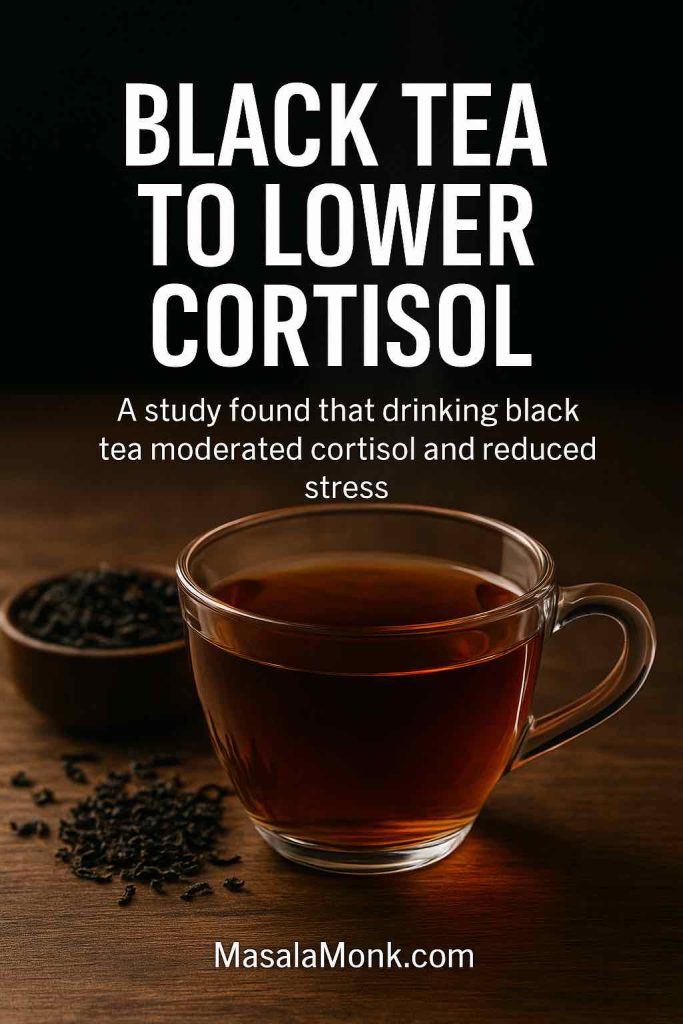
How Black Tea Works Mechanistically
- Balances Caffeine with L-Theanine: Prevents sharp cortisol spikes often associated with pure caffeine.
- Stress Recovery: Helps the body return more quickly to baseline cortisol after a stressor.
- Vascular Benefits: Theaflavins improve endothelial function, which may indirectly support stress resilience.
Practical Guidance: How Much Black Tea?
- The UCL study used 4 cups per day, spread across the day.
- Ideal times: late morning and early afternoon, when energy dips but you still want to avoid overstimulation in the evening.
- For caffeine-sensitive individuals, decaf black tea still contains theaflavins and some theanine.
Summary: Black Tea Lowers Cortisol After Stress
While green tea often gets more credit, black tea deserves recognition as a proven stress reliever. Daily consumption has been shown to lower post-stress cortisol and speed recovery — making it an accessible, enjoyable way to support long-term resilience.
Matcha Green Tea and Cortisol Reduction
Matcha is often described as green tea in concentrated form. Unlike regular green tea, where leaves are steeped and removed, matcha is made from finely ground whole leaves. That means you’re drinking all of the active compounds — catechins, amino acids, and caffeine — in a single cup. This makes matcha a particularly powerful tea for stress management and cortisol balance.
Key Compounds in Matcha
- EGCG (Epigallocatechin gallate): A potent antioxidant catechin found in higher concentrations than brewed green tea.
- L-Theanine: Matcha’s shade-growing process increases its L-theanine content, which promotes calm focus and buffers caffeine.
- Caffeine: Offers sustained energy, but without the “jitter–crash” of coffee thanks to its synergy with L-theanine.
Also Read: 5 Energizing Matcha Smoothie Recipes with Spinach for Healthy Mornings
Does Matcha Lower Cortisol?
There is growing — though context-specific — evidence that matcha may help regulate cortisol:
- A 2023 randomized controlled trial in Nutrition Journal tested matcha consumption (1.5 g twice daily) in healthy, untrained men who also undertook resistance training. After 12 weeks, the matcha group had lower salivary cortisol levels compared to placebo. Participants also reported less fatigue early in the training period 【Shigeta et al., 2023 – PubMed】.
- Another human study found that matcha plus caffeine improved attention and mental performance under mild psychological stress compared to caffeine alone. While this trial did not directly measure cortisol, it suggests matcha may enhance resilience to stress at the cognitive level 【Unno et al., 2020 – ScienceDirect】.
- In older adults with mild cognitive decline, a 12-month RCT reported that daily matcha intake improved emotional perception and trended toward better sleep quality — both outcomes tied to healthier cortisol rhythms 【Uchida et al., 2024 – PLOS ONE】.
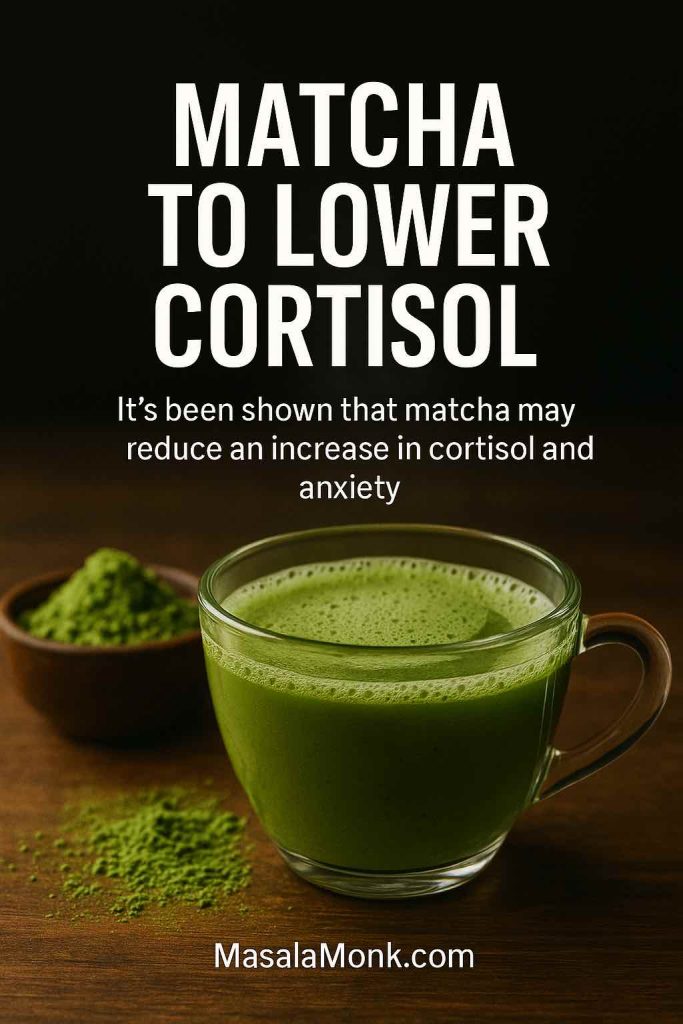
Why Matcha Works Better Than Regular Green Tea
Matcha isn’t just stronger green tea — its unique preparation changes the chemistry:
- Whole leaf advantage: By drinking the powdered leaf, you absorb the full catechin and amino acid profile.
- Shade-grown process: Boosts L-theanine, creating a calm, focused mental state despite caffeine.
- Higher bioavailability: Powdered form may improve absorption compared to steeped leaves.
Practical Guidance: How Much Matcha?
- Studies typically use the equivalent of 1–2 cups per day (½ to 1 teaspoon per serving).
- Best consumed in the morning or early afternoon, since it provides smooth, long-lasting energy.
- For sensitive individuals, pairing matcha with a protein-rich snack can further buffer caffeine’s effects.
Summary: Matcha Green Tea for Cortisol Reduction and Focus
Matcha offers one of the most concentrated natural sources of cortisol-modulating compounds. While the strongest human evidence comes from exercise-related studies, its combination of EGCG, L-theanine, and caffeine makes it a powerful daily ritual for supporting focus, reducing fatigue, and potentially balancing stress hormones.
Herbal Teas and Cortisol
Not all cortisol-lowering teas come from the traditional Camellia sinensis plant (green, black, matcha). Many herbal infusions — often called tisanes — offer their own powerful stress-relief benefits. Some work directly on cortisol, others reduce anxiety or improve sleep, which indirectly helps normalize cortisol rhythms. Among the best studied are chamomile, ashwagandha, and holy basil (tulsi).
Does Chamomile Tea Lower Cortisol and Reduce Anxiety?
Chamomile has been used for centuries as a bedtime relaxant, and modern science confirms its benefits for anxiety and sleep. But what about cortisol?
- In people with generalized anxiety disorder (GAD), chamomile treatment was associated with a more normal daily cortisol rhythm — higher morning levels and a steeper daily decline, which is considered healthier 【PubMed – Exploratory Chamomile Cortisol Study】.
- A 2025 comparative trial reported that chamomile tea led to improvements in daytime functioning and reductions in salivary cortisol levels 【Taylor & Francis – Chamomile Flower Study】.
- A systematic review of clinical trials also found that chamomile consistently reduces anxiety, with possible HPA-axis involvement, further supporting its role in cortisol balance 【PMC – Chamomile Review】.
Best use: 1–2 cups in the evening to calm the nervous system, improve sleep, and indirectly lower stress hormone load.
Also Read: Chamomile for Sleep and Insomnia.
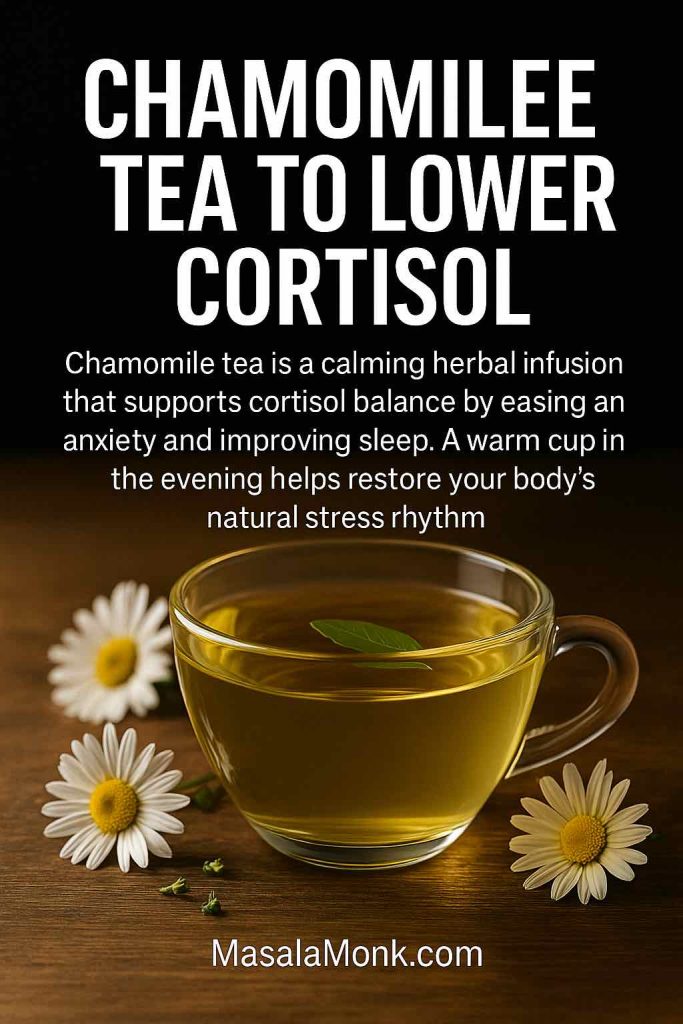
Ashwagandha Tea (Adaptogen) for Cortisol and Stress Relief
Ashwagandha (Withania somnifera) is perhaps the most researched adaptogenic herb for cortisol balance. Clinical trials repeatedly show it reduces both subjective stress and objective cortisol levels.
- The NIH Office of Dietary Supplements notes that multiple studies have demonstrated serum cortisol reductions, especially at doses of 500–600 mg/day 【NIH ODS Fact Sheet】.
- A 2023 systematic review covering 30–112 days of supplementation confirmed that ashwagandha lowers cortisol in stressed populations, while also reducing fatigue and improving sleep 【MDPI – Systematic Review】.
- An RCT in 2019 showed that daily ashwagandha supplementation significantly reduced morning cortisol while improving anxiety scores in otherwise healthy but stressed adults 【Medicine Journal – 2019 RCT】.
Best use: 1–2 cups of ashwagandha root tea, or standardized extracts in supplement form. Particularly helpful for people under chronic stress or burnout.
Read more about Ashwagandha for Anxiety and Stress Relief.
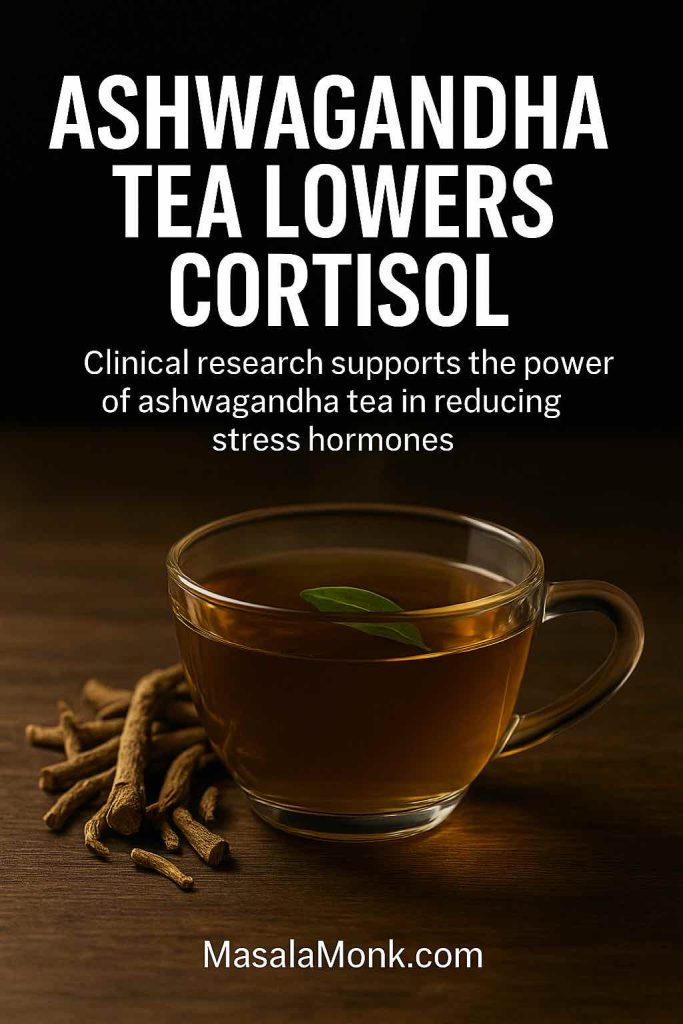
Holy Basil (Tulsi): Balancing Stress and Cortisol
Holy basil, or tulsi, is revered in Ayurveda as a sacred herb for stress and resilience. Modern trials back up its traditional use.
- In a 2022 randomized, placebo-controlled trial, participants who consumed an Ocimum tenuiflorum extract (Holixer™) for 8 weeks showed reduced salivary cortisol, lower perceived stress, and better sleep quality compared to placebo 【PubMed – Tulsi Trial】.
Though fewer studies exist compared to ashwagandha, tulsi’s combination of stress hormone modulation and subjective mood improvement makes it a strong herbal option for cortisol balance.
Best use: 1–2 cups of tulsi tea per day, morning or evening depending on personal tolerance.
Lemon Balm, Lavender, and Cortisol Support
- Lemon Balm (Melissa officinalis): Studies suggest it has anti-stress and mild sedative effects, helping with restlessness and insomnia. While cortisol-specific data are limited, its calming influence supports overall stress recovery.
- Lavender Tea: Known for reducing anxiety and improving sleep quality, lavender may indirectly support healthier cortisol cycles.
Also Read: Unlocking Restorative Sleep: 5 Lavender & Peppermint Herbal Tea Recipes for Serenity
Summary: Herbal Teas That Lower Cortisol (Chamomile, Ashwagandha, Tulsi)
Herbal teas can be just as effective as traditional teas when it comes to cortisol management:
- Chamomile → reduces anxiety, improves sleep, may lower salivary cortisol.
- Ashwagandha → strongest clinical evidence; multiple RCTs show reduced serum cortisol.
- Tulsi (Holy Basil) → improves stress, sleep, and reduces salivary cortisol in trials.
- Lemon Balm & Lavender → calming and sleep-promoting, supporting indirect cortisol balance.
For those sensitive to caffeine or seeking evening options, herbal teas are an excellent way to wind down, restore calm, and nudge cortisol back into a healthy rhythm.
Want to explore even more calming brews? We have a full guide on 5 Herbal Teas & Brews That Help Lower Cortisol Naturally.
How to Drink Tea to Lower Cortisol Naturally
Knowing which teas lower cortisol is only half the story. To actually see benefits, consistency and timing matter. Here’s how to get the most out of your tea ritual.
How Much Tea Should You Drink?
- Green Tea / Black Tea: Most clinical studies use the equivalent of 3–5 cups per day. This amount provides enough catechins, theaflavins, and L-theanine to influence cortisol levels.
- Matcha: Typically 1–2 servings per day (½–1 teaspoon of powder whisked into hot water). Since matcha is concentrated, less is needed.
- Chamomile: 1–2 cups in the evening can improve sleep and relaxation.
- Ashwagandha: 1–2 cups daily (root tea) or standardized supplements (~500–600 mg/day) are most often studied.
- Tulsi: 1–2 cups daily, morning or evening, depending on preference.
Best Times to Drink Tea for Cortisol Balance
- Morning: Green tea or matcha works with the body’s natural cortisol awakening response, providing calm focus.
- Late Morning / Early Afternoon: Black tea offers steady energy and helps avoid midday slumps.
- Evening: Chamomile, tulsi, or lemon balm prepare the body for rest by calming the nervous system and supporting cortisol’s nighttime decline.
Brewing Tips for Maximum Benefits
- Steep Time Matters: Green tea ~2 minutes, black tea ~3–4 minutes, chamomile ~5–7 minutes. Oversteeping can make tea bitter but won’t add extra benefits.
- Water Temperature: Avoid boiling water for green tea and matcha (ideal ~80°C / 176°F) to protect delicate catechins.
- Quality Counts: Loose leaf or high-grade tea bags often contain more active compounds than generic blends. Organic options reduce pesticide exposure.
Combine Tea with Stress-Lowering Practices
Tea is powerful on its own, but combining it with relaxation techniques can enhance its effects:
- Pair your evening chamomile with deep breathing or meditation.
- Drink matcha mindfully, focusing on aroma, warmth, and taste — a mini tea ceremony for calm.
- Use afternoon black tea as a cue to take a short walk or stretch break, combining cortisol-lowering habits.
For a complete lifestyle approach, pair your tea ritual with smart eating habits. This Diet Strategies to Lower Cortisol Levels article walks you through foods that calm the HPA axis and those that trigger stress hormones.
Risks of Drinking Tea for Cortisol Management
While tea is generally safe, there are important caveats to keep in mind.
Caffeine Sensitivity
- Green, black, and matcha teas contain caffeine, which can temporarily raise cortisol in sensitive individuals.
- If you notice jitters or disrupted sleep, switch to decaf versions or herbal teas in the evening.
Iron Absorption
- Polyphenols in tea can reduce absorption of non-heme iron from plant foods.
- To minimize this, drink tea between meals rather than with meals if you’re at risk of anemia.
Herbal Tea Interactions
- Ashwagandha: May interact with thyroid medication, sedatives, or blood pressure drugs.
- Chamomile: Can interact with blood thinners (like warfarin) or sedatives.
- Tulsi: Limited data, but may influence blood sugar or anticoagulant effects.
Always check with a healthcare professional if you take medications or have chronic conditions.
Science Still Has Gaps
- Many tea-and-cortisol studies are short-term (4–12 weeks) and involve small groups.
- Effects vary widely between individuals due to metabolism, stress levels, and genetics.
- More large-scale, head-to-head trials are needed to compare teas directly.
And if your stress feels highest in the mornings, you’ll find useful guidance in Morning Anxiety? Your Cortisol Might Be to Blame.
Final Thoughts on Tea and Cortisol Reduction
The evidence is clear: tea is more than a comfort drink. With compounds like EGCG, theaflavins, and L-theanine, teas such as green, black, and matcha actively influence cortisol regulation. Meanwhile, herbal infusions like chamomile, ashwagandha, and tulsi reduce anxiety, improve sleep, and even lower cortisol in clinical studies.
Does this mean tea alone will erase the effects of chronic stress? Not quite. But when woven into a balanced lifestyle that includes quality sleep, exercise, mindful eating, and relaxation practices, tea can be a powerful daily ally.
Think of it this way: every cup is not just hydration, but a micro-ritual — a pause in the day that helps the body reset and the mind unwind. Over weeks and months, these small choices add up, supporting healthier cortisol rhythms and more resilient stress responses.
So the next time life feels overwhelming, remember: your teacup might just be your most accessible stress-management tool.
Frequently Asked Questions: Best Tea to Lower Cortisol
1. What is the best tea to lower cortisol naturally?
The best teas to lower cortisol are green tea, matcha, black tea, chamomile, ashwagandha, and tulsi (holy basil). Green tea and matcha have the strongest scientific evidence for lowering cortisol directly, while herbal teas like chamomile and ashwagandha work by calming the nervous system and improving sleep.
2. Does chamomile tea really lower cortisol?
Yes — chamomile tea has been shown to reduce anxiety, improve sleep, and even lower salivary cortisol in some studies. It’s one of the gentlest and most accessible teas for stress relief, making it perfect for bedtime.
3. Can black tea reduce stress hormones?
Black tea helps the body recover faster from stress. Research shows that daily black tea drinkers experience lower cortisol levels after stressful events compared to placebo. It’s a great mid-day option for steady focus without spiking stress hormones.
4. Is green tea good for lowering cortisol?
Absolutely. Green tea’s combination of EGCG and L-theanine helps calm the brain while regulating cortisol production. Drinking 3–5 cups per day has been linked to lower stress hormone levels and improved mental resilience.
5. How does matcha compare to green tea for cortisol?
Matcha is like a concentrated version of green tea. Because you consume the whole powdered leaf, matcha delivers more EGCG and L-theanine per cup, making it one of the most effective teas for reducing cortisol and boosting calm focus.
6. Can herbal teas like ashwagandha lower cortisol?
Yes. Ashwagandha is an adaptogen with strong clinical evidence showing significant reductions in cortisol levels. Drinking it as a tea or infusion can be especially helpful for people under chronic stress.
7. What about tulsi (holy basil) tea for cortisol?
Tulsi, or holy basil, is often called the “Queen of Herbs” in Ayurveda. Studies suggest that tulsi tea can lower salivary cortisol, improve sleep quality, and reduce perceived stress, making it a soothing daily choice.
8. How many cups of tea should I drink to reduce cortisol?
Most studies recommend 3–5 cups of green or black tea per day, 1–2 cups of matcha, and 1–2 cups of herbal teas like chamomile, tulsi, or ashwagandha. Consistency over weeks is key to seeing results.
9. Does caffeine in tea raise cortisol?
Tea does contain caffeine, which can raise cortisol short-term, but it’s balanced by L-theanine, which smooths the effect. For sensitive individuals, decaf versions or herbal teas are great options that still support cortisol balance.
10. Can drinking tea before bed help with cortisol and sleep?
Yes — herbal teas like chamomile, lemon balm, lavender, or tulsi are especially effective in the evening. They relax the body, support lower nighttime cortisol, and help improve sleep quality.
11. Which tea is the best overall for lowering cortisol?
If you want the strongest science-backed option, matcha and green tea come out on top for direct cortisol reduction. But if you struggle with sleep or nighttime stress, chamomile or tulsi may be the best teas for you.


